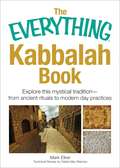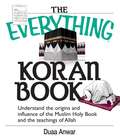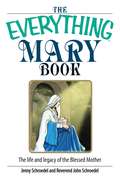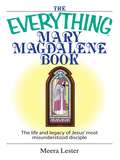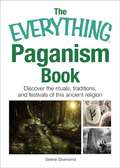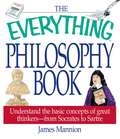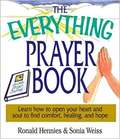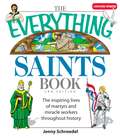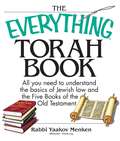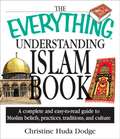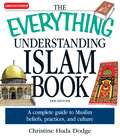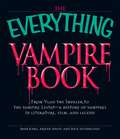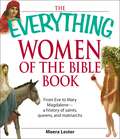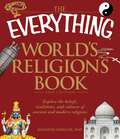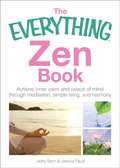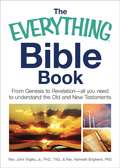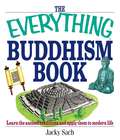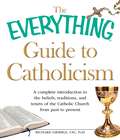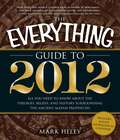- Table View
- List View
The Everything Kabbalah Book: Explore This Mystical Tradition—From Ancient Rituals to Modern Day Practices (Everything® Series)
by Mark ElberFurnishing an accessible introduction to the traditions and teachings of the Kabbalah, this informative volume discusses the origins, history, study, and trends of Jewish mysticism, covering such topics as meditation and mystical techniques, the Kabbalahistic theory of creation and the human role in the universe, Kabbalahistic philosophy, and more.
The Everything Koran Book
by Duaa AnwarRecent events have caused tremendous interest in the Muslim religion, yet very few people understand its important tenets, as outlined in its holy book, the Koran. The Everything Koran Book, written by Duaa Anwar-an Egyptian Muslim raised in the United Arab Emirates-is your essential reference to understanding the principle teachings of Allah, as revealed in the 114 chapters of the Koran. Offering a wealth of information on the history and significance of this holy book--as well as important translations and interpretations of key passages--The Everything Koran Book helps you discover the fundamental truths behind this 1,400-year-old religion. Readers learn to: Comprehend the true teachings of the Muslim faith Discern truth from fiction Interpret Muslim symbols Know how Muslims celebrate holy days Understand Muslim law and social practices Grasp the Koran's teachings on the hereafter The Everything Koran Book is your one-stop resource for understanding and appreciating this sacred text of the Muslim faith.
The Everything Koran Book: Understand The Origins And Influence Of The Muslim Holy Book And The Teachings Of Allah
by Duaa Anwar"Recent events have caused tremendous interest in the Muslim religion, yet very few people understand its important tenets, as outlined in its holy book, the Koran.The Everything Koran Book, written by Duaa Anwar-an Egyptian Muslim raised in the United Arab Emirates-is your essential reference to understanding the principle teachings of Allah, as revealed in the 114 chapters of the Koran. Offering a wealth of information on the history and significance of this holy book--as well as important translations and interpretations of key passages--The Everything Koran Book helps you discover the fundamental truths behind this 1,400-year-old religion.Readers learn to:Comprehend the true teachings of the Muslim faithDiscern truth from fictionInterpret Muslim symbolsKnow how Muslims celebrate holy daysUnderstand Muslim law and social practicesGrasp the Koran's teachings on the hereafterThe Everything Koran Book is your one-stop resource for understanding and appreciating this sacred text of the Muslim faith.
The Everything Koran Book: Understand the origins and influence of the Muslim Holy Book and the teachings of Allah
by Duaa AnwarRecent events have caused tremendous interest in the Muslim religion, yet very few people understand its important tenets, as outlined in its holy book, the Koran. The Everything Koran Book, written by Duaa Anwar-an Egyptian Muslim raised in the United Arab Emirates-is your essential reference to understanding the principle teachings of Allah, as revealed in the 114 chapters of the Koran. Offering a wealth of information on the history and significance of this holy book--as well as important translations and interpretations of key passages--The Everything Koran Book helps you discover the fundamental truths behind this 1,400-year-old religion. Readers learn to: Comprehend the true teachings of the Muslim faith Discern truth from fiction Interpret Muslim symbols Know how Muslims celebrate holy days Understand Muslim law and social practices Grasp the Koran's teachings on the hereafter The Everything Koran Book is your one-stop resource for understanding and appreciating this sacred text of the Muslim faith.
The Everything Mary Book: The Life And Legacy of the Blessed Mother
by Jenny SchroedelWhile Catholics have long admired and honored Mary, other Christian denominations are now devoting special Bible study groups to her as well. The Everything Mary Book explores the often-debated place of Mary in Christianity, as well as her role in the broader world, both secular and religious. With this comprehensive and entertaining biography, you'll unravel the mysteries of one of the Bible's most intriguing and misunderstood women.Learn about:The Immaculate Conception and the Virgin BirthThe Virgin Mary in early texts besides the Bible, including the Gnostic GospelsMary in medieval timesThe role of Mary in popular cultureIslam and MaryThe Everything Mary Book covers everything you need to know about Mary's life and her impact on millions of Christians throughout the world.
The Everything Mary Magdalene Book (The Everything®)
by Meera LesterWith The Everything Mary Magdalene Book, you'll unravel the mystery of the Bible's most misunderstood woman. As an eyewitness to Jesus' resurrection and the turbulent birth of Christianity, Mary Magdalene played a crucial yet unexamined role in the Bible-until now.In this comprehensive investigative guide to the life of Mary Magdalene, you'll explore:Complete and concise analyses of Mary Magdalene in the New TestamentMary Magdalene's appearance in the Gnostic gospelsThe shaky basis for the interpretation of Mary Magdalene as a repentant prostituteThe modern discoveries and representations of Mary Magdalene as a vital follower of Jesus' early movementsMary Magdalene's inspirational role in the world todayFrom her misrepresentation as a fallen woman to her growing impact on modern Christianity, The Everything Mary Magdalene Book details the Bible's most enigmatic of Jesus' followers, putting some myths to rest and bringing the truth to light!
The Everything Paganism Book: Discover the Rituals, Traditions, and Festivals of This Ancient Religion
by Selene SilverwindAlthough Pagans have endured centuries of persecution and condemnation, Paganism has risen to become the seventh-largest organized religion in the world-and is still growing. The Everything Paganism Book, written by Selene Silverwind, uncovers the history and beliefs of this ancient faith. The author guides you through the ideology, tenets, and practices that make up Paganism, exploring its Celtic origins and showing how some Pagan rites and rituals have become mainstream today.
The Everything Philosophy Book: Understand the Basic Concepts of Great Thinkers—from Socrates to Satre (Everything® Series)
by James MannionAt last, you can grasp the most difficult concepts of thought!If you&’ve always wanted to learn about philosophy but were too intimidated to get past the first word ending in &“ism,&” The Everything Philosophy Book provides simple explanations guaranteed to make philosophic ideas and concepts easy to understand. This entertaining book offers a broad overview of many diverse schools of thought—from antiquity up through the present day. In plain English, author James Mannion explains all of the great philosophies—and even provides contemporary examples to put them in perspective. Interspersed are fascinating sidebars that offer helpful hints toward understanding complex concepts and little-known facts about the lives of great philosophers. The Everything Philosophy Book delves into the minds of such philosophers as: -Socrates, Plato, and Aristotle -Augustine and Aquinas -Buddha and Confucius -Spinoza and Descartes -Locke and Hume -Voltaire and Rousseau -Mill and Nietzsche -Russell and Sartre Endlessly fascinating—and always clear and concise—The Everything Philosophy Book will be welcomed by anyone who wants to broaden his or her outlook on life.
The Everything Prayer Book (The Everything Series)
by Sonia Weiss Ronald HenniesAn inspirational guide to communication with God provides an ecumenical approach to prayer, demonstrating how prayer can positively transform one's life and showing how to pray when searching for peace of mind, grieving over the death of a loved one, confronting a career setback, battling an illness, or making a difficult choice.
The Everything Saints Book: The Inspiring Lives of Martyrs and Miracle Workers Throughout History (Everything® Series)
by Jenny SchroedelIn The Everything Saints Book, you'll learn about the fascinating lives (and sometimes untimely deaths) of more than 85 saints and the miracles ascribed to them.In this authoritative new edition of The Everything Saints Book, you'll find rare quotes, little-known facts, and captivating stories of heroism and personal sacrifice, including: -Traditional saints -European, African, and Asian saints -Soon-to-be saints -Disappearing saints From Mary, the mother of Jesus, to early European saints like Saint Valentine, to modern men and women who are now being considered for sainthood, The Everything Saints Book reveals the personalities and piety of these intriguing people-and the ways in which their unwavering devotion to God transformed their lives and the lives of those around them.
The Everything Torah Book
by Rabbi Yaakov MenkenFrom the Penteteuch and Nevi'im to the Ketuvim and the oral Torah, this straightforward reference walks you through God's instructions to His people and explains how these teachings are incorporated into Jewish life. The Everything Torah Book presents the tenets of the Jewish faith in an easy-to-understand reference. Fascinating insights into the history, stories, parables, and personalities that are featured in this sacred scripture will bring teachings to life. Regardless of your faith, The Everything Torah Book offers a wonderful insight into Jewish culture. Learn about: Jewish history and heritage What constitutes the Torah The importance of the Torah in the Jewish community How to expand your learning Incorporating teachings into your life Written by a rabbi, The Everything Torah Book presents the tenets of Jewish faith, tradition, and culture in one all-inclusive resource.
The Everything Torah Book
by Yaakov MenkenFrom the Penteteuch and Nevi'im to the Ketuvim and the oral Torah, this straightforward reference walks you through God's instructions to His people and explains how these teachings are incorporated into Jewish life. The Everything Torah Book presents the tenets of the Jewish faith in an easy-to-understand reference. Fascinating insights into the history, stories, parables, and personalities that are featured in this sacred scripture will bring teachings to life. Regardless of your faith, The Everything Torah Book offers a wonderful insight into Jewish culture. Learn about: Jewish history and heritage What constitutes the Torah The importance of the Torah in the Jewish community How to expand your learning Incorporating teachings into your life Written by a rabbi, The Everything Torah Book presents the tenets of Jewish faith, tradition, and culture in one all-inclusive resource.
The Everything Torah Book: All You Need To Understand The Basics Of Jewish Law And The Five Books Of The Old Testament
by Yaakov MenkenFrom the Penteteuch and Nevi'im to the Ketuvim and the oral Torah, this straightforward reference walks you through God's instructions to His people and explains how these teachings are incorporated into Jewish life. The Everything Torah Book presents the tenets of the Jewish faith in an easy-to-understand reference. Fascinating insights into the history, stories, parables, and personalities that are featured in this sacred scripture will bring teachings to life. Regardless of your faith, The Everything Torah Book offers a wonderful insight into Jewish culture.Learn about:Jewish history and heritageWhat constitutes the TorahThe importance of the Torah in the Jewish communityHow to expand your learningIncorporating teachings into your lifeWritten by a rabbi, The Everything Torah Book presents the tenets of Jewish faith, tradition, and culture in one all-inclusive resource.
The Everything Understanding Islam Book
by Christine Huda DodgeIn an effort to explain this often misunderstood religion, The Everything Understanding Islam Book covers everything from basic beliefs and practices to Islamic influence on Western civilization. The Everything Understanding Islam Book provides you with a complete and easy-to-read introduction to Islam, including: The life of Muhammad the Prophet; The Qur'an and the Sunnah; The six articles of faith and other Muslim beliefs; Islam's relationship to other faiths; The five pillars of practice; Muslim daily life; Women and Islam.
The Everything Understanding Islam Book
by Christine Huda DodgeMuslim convert Christine Huda Dodge possesses a unique foot-in-each-world perspective on Islam. With her comprehension of Islam and her understanding of the kinds of questions and issues that perplex Westerners, she is the perfect guide to: The life of Muhammad the Prophet The Qur'an and the Sunnah The five pillars of practice Muslim daily life Women and Islam This guide is ideal for casual readers and students alike. Authoritative, accessible, detailed, and celebratory, it covers everything from basic beliefs and practices to the Islamic influences on Western civilization.
The Everything Understanding Islam Book: A Complete and Easy to Read Guide to Muslim Beliefs, Practices, Traditions, and Culture
by Christine Huda DodgeA Simon & Schuster eBook. Simon & Schuster has a great book for every reader.
The Everything Vampire Book: From Vlad the Impaler to the vampire Lestat - a history of vampires in Literature, Film, and Legend (Everything® Series)
by Barb Karg Arjean Spaite Rick Sutherland• An affordable, accessible companion to vampire literature, films, and TV • Several vampire movies are due out in 2008 and 2009: Twilight, Underworld: Rise of the Lycans, and The Historian • Vampire communities are flourishing on the Internet—a simple &“vampire societies&” search on Google yields over 580,000 results • Everything reference books have sold more than 575,000 copies! Bram Stoker&’s Dracula Anne Rice&’s Lestat Stephenie Meyer&’s Edward Who can resist these erotic, exotic creatures of the night? And who wants to? In The Everything® Vampire Book, readers unearth all the secrets of this beautiful, terrible underworld, including: • How vampires live, hunt, and endure • Why they refuse to die • How to destroy a vampire—from holy water to decapitation • The best—and worst—vampire books, TV shows, and films • What constitutes the &“vampire lifestyle&” and blood fetish practices • All the incarnations of vampires—from the Greek Lamia to the Indian Churel • Real-life encounters with vampires Vampire aficionados will enjoy sinking their teeth into the notorious history and bewitching tales in The Everything® Vampire Book!
The Everything Women of the Bible Book
by Meera LesterThe Everything Women of the Bible Book examines these luminaries and their illustrious sisters who grace the pages of the Bible. This compelling and easy-to-use guide introduces you to: Adulteresses, Courtesans, Dancers, and Deceivers; Women Who Caused Murder; The Prophetesses; Great Beauties; Women Disciples and Followers of Jesus. In The Everything Women of the Bible Book, you'll find fascinating and moving stories of women living in extraordinary times. You'll understand more about the popular, often retold Bible stories and you'll discover little-known heroines, queens, wives, disciples, and lovers. And you'll be inspired by their bravery, intelligence, and faith.
The Everything Women of the Bible Book: From Eve to Mary Magdalene--a history of saints, queens, and matriarchs
by Meera LesterA Simon & Schuster eBook. Simon & Schuster has a great book for every reader.
The Everything World's Religions Book: Explore the beliefs, traditions, and cultures of ancient and modern religions (The Everything)
by Kenneth ShoulerFrom the Native American tribal faiths and the Judeo-Christian traditions to Scientology and other nascent religions, man's search for God takes many fascinating forms. In this easy-to-use and comprehensive guide, you'll explore the intriguing dogma and rituals, cultural convictions, and often-checkered backgrounds and histories of the world's religions. This mystical tour of major and minor religions, both ancient and contemporary, includes:How religions deal with the issue of evilWhich religions believe in an afterlife--and what you have to do to get thereThe history and moral foundations of major religionsBelief in non-belief and the fundamentals of atheismSpecial holidays and festivals central to each religionFrom Hinduism to Hare Krishna and from evangelicalism to Wicca, this book includes more than fifty religious perspectives and denominations. It's the ultimate guide to exploring the beliefs and traditions of religions around the world.
The Everything Zen (The Everything®)
by Jacky SachDo you find yourself restless and distracted by the hustle and bustle of the modern world? Have you sought comfort in possessions and acclaim only to be disappointed by their emptiness? If so, you are not along. The Everything Zen Book introduces you to thousands of years of ancient teachings that can help you achieve inner peace and unity with the world around you. Whether you are at home or in the office, this easy-to-follow guide shows you how to apply ancient Zen principles to every area of your life—from relationships and your career to artistic expression and your health.
The Everything® Bible Book
by Kenneth Brighenti John Trigilio Jr.For centuries, the Bible has served as a moral compass and a source of God’s word. Packed with stories of mystery, intrigue, and inspiration, the Bible is also valued as sacred literature. Unfortunately, disjointed narratives, confusing language, and an innumerable cast of characters can make reading the Bible a challenge for many people. The Everything® Bible Book is a lucid and richly detailed guide to the history, literature, stories, parables, and personalities of both the Old and New Testaments. From Genesis to Revelations, Abraham to Paul, this book covers the various theories on the origins of the Bible, compares the different editions, and describes in detail the Bible’s culture and times. This highly accessible book also includes information on: All the books of the Bible and their content The various translations and versions Interpretations of the Bible through the ages Comparisons of the gospels A book-by-book reading plan Filled with easy-to-follow information and fascinating historical perspective, The Everything® Bible Book is the perfect resource for anyone who wants to unravel and understand the complex mysteries of the Good Book but is intimidated by the prospect.
The Everything® Buddhism Book
by Jacky SachIn recent years, more and more people have been turning to Buddhist ethics for a greater understanding of themselves and their place in the world. This comprehensive guide to the ancient origins and modern practices of the Buddhist faith gives readers a complete understanding of the life of Buddha and the evolution of his teachings--from India and Tibet to the West.
The Everything® Guide To Catholicism
by Richard GribbleWhy do Catholics confess their sins? What does Jesus' second coming mean? How does someone, such as Mother Teresa, become a saint?This guide answers these questions and more. This resource addresses the teachings, tradition, history, and theology of the Catholic Church. With this guide, you'll learn the foundations of the faith. Featuring explanations of:What the parts of the Mass mean Baptism, confirmation, and the other sacraments The priesthood and religious life today The life, death, and resurrection of Jesus Christ Mary's relationship with modern Catholics Sin, judgment, and salvationThis approachable book also highlights twenty-first-century issues and questions modern Catholics face, including gay marriage, abortion, and the death penalty. It's the ultimate guide to understanding Catholicism for readers of all backgrounds and faiths.
The Everything® Guide to 2012
by Mark HeleyWhat's going to happen on December 21, 2012? The winter solstice in 2012 is the end of the current Mayan calendar cycle. There are lots of theories about what will happen on this date. Will all life on Earth end? Will humans reach a higher spiritual plane? Will visitors from another planet arrive? Noted Mayan expert Mark Heley leads you through all the theories and debates surrounding this mysterious event. He takes a reasoned approach to the subject, relying on astronomy and climate changes, rather than myths and stories. This book features fascinating information, including: The Mayan cyclical view of time Modern interpretations of prophecies and predictions of rapid change Galactic alignment and Mayan theories on the origin of the universe Earth changes, the fall of civilizations, and apocalyptic theories You will learn about the possible cultural and social impacts of the predicted events. The author also shares his ideas on what life might be like around and after 12/21/2012. This guide also includes an easy-to-use Mayan calendar date conversion chart. With this chart, you can use the calendar as a personal predictive and astrological tool as you prepare for the quickly approaching date.
